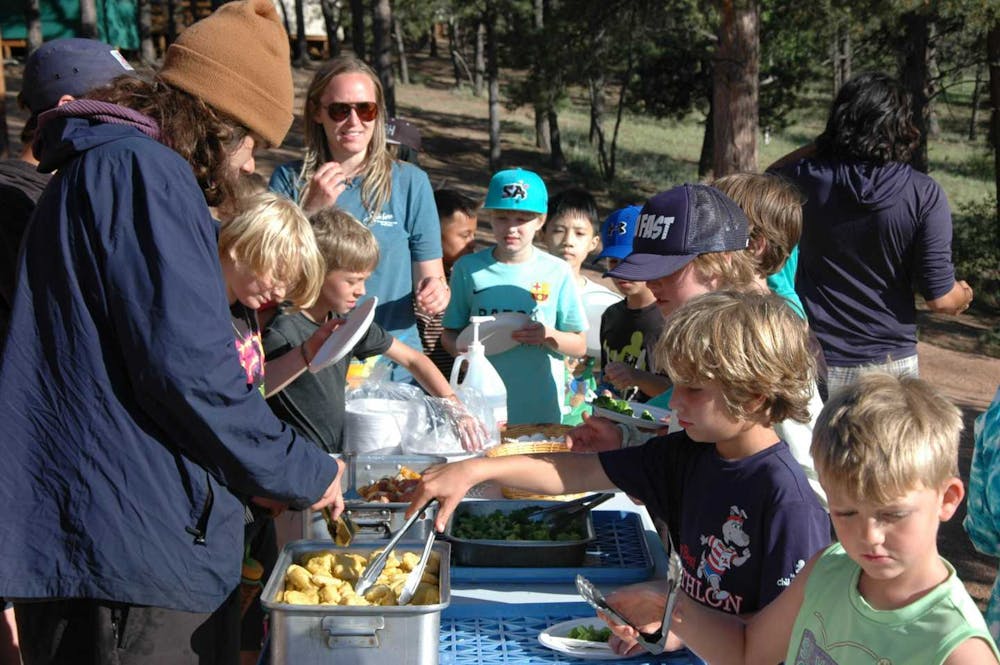Hot Tips #4: Eating at Camp

Food concerns are real. Food is cultural, familial and foundational to who we are as humans. It is both fuel and comfort–and sometimes it is a little scary when you don’t know what you are going to eat or, maybe more concerning, if you are going to like it.
The food at camp is excellent: home-cooked from scratch with real ingredients and designed for eaters of all ages and stages. In fact, our food is one of the things our campers love most about camp! Most of the meals at camp are “family style” with different parts of the meal in serving bowls which are passed around the table, making sure everyone has “firsts” before we send the bowl back to the kitchen for seconds…thirds…or even fourths! We also have quite a few buffet meals–so you can choose your favorite items from the buffet!
Many of our meals are “deconstructed”–so, for example, on spaghetti night, there would be a bowl of noodles, a bowl of meat sauce, a basket of bread, a bowl of salad, a bowl of dressing, parmesan and butter pads. Campers who preferred buttered noodles can make their own, while campers who are vegetarians can help themselves to the vegetarian red sauce in the kitchen windows, or our GF campers can visit the kitchen windows and receive gluten free noodles and bread–knowing that our sauces and dressings are almost always made gluten free.
We are “nut-aware” which means we do have nuts and nut butters in the lodges and in the kitchens, but our cooks (especially our baker) are very aware of the allergies and make sure to communicate if there are nuts or other allergens in things like breads or cookies.
We also accommodate other food allergies and vegetarians, but it is difficult to accommodate the vegan diet at camp due to the need for substitute protein sources with some dairy-based products.
It is most important, though, that campers are getting enough to eat, both in camp and on trips, which is why it is so important for campers to communicate with staff if they are hungry. We always have snacks available at the back of both lodges (eg: fresh fruit, cheese sticks, snack crackers, etc.) as well as PB & J at every meal. We do not want campers to only eat snacks or peanut butter and jelly sandwiches, but we do want to give them the option for supplemental food so they can stay fueled during our long summer days.
Just like trying new activities at camp, we are hopeful that campers can try new foods while they are here–which is why our cooks are so thorough in their planning and execution of the weekly menus. While we will not force campers to eat new foods, we will encourage them to try a “no-thank-you” bite of something that might be a little new or unusual.
Everyone gets really hungry after a day on the trail, and sometimes dinner is disrupted by a rainstorm or a delay, which is why it is always helpful (and encouraged) for campers to bring their own “personal snack bag” which they make at outcamp prior to leaving for a trip. This gives them the autonomy to eat a snack when they are feeling a little “hangry” and helps reduce food stress in the backcountry.
If your camper has specific dietary needs, please make sure to address those with the directors and/or with the kitchen staff–it helps everyone know how best to support each camper to make sure they can be fueled and also can enjoy the camp experience!

HOT TIPS FOR PARENTS
- DO: Talk to your camper about food differences between home and camp: at camp, food is cooked for large groups of people and can’t always be modified…but that is why it is often “deconstructed” into component parts so you can combine them the way you would like.
- DO: Call and talk to the kitchen staff or directors if you have questions or if your camper has dietary restrictions.
- DO: If your child is gluten free, do send them some of their favorite snacks, bread and desserts. We have all of these things in the GF variety–but sometimes our gluten free campers prefer their own snacks for activities and trips.
- DON’T: Send food in care packages to supplement food at meals. We will throw away care package food. If you are sending food to supplement an allergy, please send it to: Food Service Manager (Big Spring or High Trails) For: (Your Camper’s Name here) 2000 Old Stage Road Florissant, CO 80816
HOT TIPS FOR CAMPERS:
- DO: Remember the ABC’s of Camp and apply those to food, too! Be Adventurous when it comes to trying new things Be Brave and go outside of your food comfort zone & Challenge yourself to go home ready to eat something new…or even make your parents something new…like Pita Pizzas!
- DO: Make sure and drink 2-3 liters of water a day–sometimes our bodies mistake dehydration for hunger, so before you go get a snack from the lodge, have a big, big drink of water!
- DO: Let your counselors and trip leaders know if you have a dietary restriction or allergy–this way you can make sure you have the food and snacks you want both in and out of camp.
- DO: Eat real food during the day. We have three delicious, nutritious and filling meals that are prepared every day…and we have dessert at two of them (sometimes there are even BREAKFAST brownies!)
- DON’T: Go hungry. Talk to a trusted adult if you are having a hard time finding food that you like to eat at camp. We can figure it out with you!

